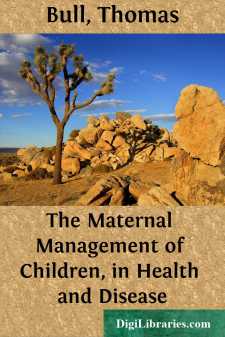Categories
- Antiques & Collectibles 13
- Architecture 36
- Art 48
- Bibles 22
- Biography & Autobiography 813
- Body, Mind & Spirit 142
- Business & Economics 28
- Children's Books 17
- Children's Fiction 14
- Computers 4
- Cooking 94
- Crafts & Hobbies 4
- Drama 346
- Education 46
- Family & Relationships 57
- Fiction 11829
- Games 19
- Gardening 17
- Health & Fitness 34
- History 1377
- House & Home 1
- Humor 147
- Juvenile Fiction 1873
- Juvenile Nonfiction 202
- Language Arts & Disciplines 88
- Law 16
- Literary Collections 686
- Literary Criticism 179
- Mathematics 13
- Medical 41
- Music 40
- Nature 179
- Non-Classifiable 1768
- Performing Arts 7
- Periodicals 1453
- Philosophy 64
- Photography 2
- Poetry 896
- Political Science 203
- Psychology 42
- Reference 154
- Religion 513
- Science 126
- Self-Help 84
- Social Science 81
- Sports & Recreation 34
- Study Aids 3
- Technology & Engineering 59
- Transportation 23
- Travel 463
- True Crime 29
The Maternal Management of Children, in Health and Disease
by: Thomas Bull
Categories:
Description:
Excerpt
Chapter I.
The line of demarcation made between infancy and childhood, both by ancient and modern writers, has always been arbitrary. I would draw the line between the two, at a period of time which appears to me to be the most natural, the most simple, and least likely to lead the reader into the danger of misapplying any part of the practical directions of this, or any future chapter of the work. We will consider, then, thatвÐâ
Infancy, commencing with birth, extends to about the end of the second year, when the first dentition is completed.
Childhood extends from about the second, to the seventh or eighth year, when the second dentition is commenced.
Sect. I. DIETETICS OF INFANCY.
In the early months of infancy the organs of digestion are unsuited to any other food than that derived from the breast of the mother. So little capable are they, indeed, to digest any other, even of the blandest and most digestible kind, that probably not more than one infant in six or seven ever arrives at the more advanced periods of life when deprived of the kind of nourishment nature intended for this epoch.
It is not every parent, however, who is able to become a nurse; and with many this office would not only be highly injurious to their own health, but materially so to that of their offspring. This may arise from various causes, hereafter to be noticed, but whenever they exist a wet-nurse is demanded.
Again, the latter resource is not always attainable, so that the hazardous experiment of an artificial diet, or bringing up by hand, as it is then termed, is obliged to be resorted to.
Thus, infantile dietetics naturally divides itself into Maternal
Nursing, Wet-Nurse Suckling, And Artificial Feeding.
1. MATERNAL NURSING.
PLAN OF SUCKLING.
From the first moment the infant is applied to the breast, it must be nursed upon a certain plan. This is necessary to the well-doing of the child, and will contribute essentially to preserve the health of the parent, who will thus be rendered a good nurse, and her duty at the same time will become a pleasure.
This implies, however, a careful attention on the part of the mother to her own health; for that of her child is essentially dependent upon it. Healthy, nourishing, and digestible milk can be procured only from a healthy parent; and it is against common sense to expect that, if a mother impairs her health and digestion by improper diet, neglect of exercise, and impure air, she can, nevertheless, provide as wholesome and uncontaminated a fluid for her child, as if she were diligently attentive to these important points. Every instance of indisposition in the nurse is liable to affect the infant.
And this leads me to observe, that it is a common mistake to suppose that, because a woman is nursing, she ought therefore to live very fully, and to add an allowance of wine, porter, or other fermented liquor, to her usual diet. The only result of this plan is, to cause an unnatural degree of fulness in the system, which places the nurse on the brink of disease, and which of itself frequently puts a stop to the secretion of the milk, instead of increasing it....


